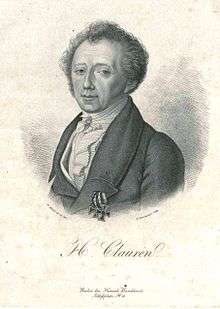Heinrich Clauren
Carl Gottlieb Samuel Heun (20 March 1771 – 2 August 1854), better known by his pen name Heinrich Clauren, was a German author.[1][2]
Heinrich Clauren | |
|---|---|
 Lithograph | |
| Born | Carl Gottlieb Samuel Heun 20 March 1771 Doberlug-Kirchhain, Lusatia |
| Died | 2 August 1854 (aged 83) Berlin |
| Pen name | Heinrich Clauren |
| Occupation | Author |
| Language | German |
Biography
Born on 20 March 1771 in Doberlug, Lower Lusatia. Heun went into the Prussian civil service, and wrote in his spare time. He published under the pseudonym H. Clauren (an anagram of Carl Heun), and became one of the most popular authors of fiction for the middle class in the first half of the nineteenth century.[2][3]
In 1825, Wilhelm Hauff published a parody of Heun's novels, Der Mann im Monde (The Man in the Moon), imitating his style, and published under his pen name H. Clauren. Heun brought a lawsuit against Hauff, and won, leading Hauff to write another book, Kontroverspredigt über H. Clauren und den Mann im Mond (1826), successfully destroying the reputation of Heun's works.
Heun's collected works were published in 25 volumes as Gesammelte Schriften in 1851. He died on 2 August 1854 in Berlin.[2][3]
Influence
One of Heun's short stories, "Die graue Stube", was translated for the French ghost story anthology Fantasmagoriana (1812). Fantasmagoriana was read by Lord Byron, Mary Shelley, Percy Bysshe Shelley, John William Polidori and Claire Clairmont at the Villa Diodati in Cologny, Switzerland during 1816, the Year Without a Summer, and inspired them to write their own ghost stories, including "The Vampyre" (1819), and Frankenstein (1818), both of which went on to shape the Gothic horror genre.[4] A. J. Day describes how many themes and ideas in Frankenstein are a reflection of Fantasmagoriana, and uses passages from Heun's "Die graue Stube" to compare to both the novel and Shelley's recollection of her inspiration in the preface to the novel.[5]
Another of his short stories, "The Robber's Castle", may have been one of the sources of inspiration for Edgar Allan Poe's "The Fall of the House of Usher" (1839).[6]
See also
- Christian Köhler, an artist, originally Heun's stableboy
References
- Jacob Achilles Mähly (1876), "Clauren, Heinrich", Allgemeine Deutsche Biographie (ADB) (in German), 4, Leipzig: Duncker & Humblot, pp. 281–282
- Richter, Karl (1957), "Clauren, Heinrich", Neue Deutsche Biographie (NDB) (in German), 3, Berlin: Duncker & Humblot, pp. 267–268; (full text online)
- The Oxford Companion to German Literature. Oxford University Press. 2005.
- Macdonald, D. L.; Scherf, Kathleen (2008). "Introduction". The Vampyre and Ernestus Berchtold; or, The Modern Œdipus. Peterborough: Broadview Editions. p. 10.
- Day, A. J. (2005). "Searching for the Muse". Fantasmagoriana; Tales of the Dead. St Ives: Fantasmagoriana Press. pp. 147–148.
- Hansen, Thomas S. (Spring 1992). "Poe's 'German' Source for 'The Fall of the House of Usher': The Arno Schmidt Connection". Southern Humanities Review. 26 (2): 101–13.
| Wikimedia Commons has media related to Heinrich Clauren. |